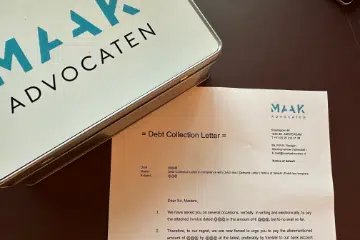
In today’s fast-paced and ever-evolving business landscape, debt collection has become an intricate process that requires a strategic approach. As Dutch businesses face the challenges of recovering outstanding debts, it is crucial to explore advanced techniques that can enhance their success rates. Leveraging technology, customizing communication strategies, implementing data analytics, utilizing alternative dispute resolution, enhancing legal enforcement measures, and building strong relationships with debtors are key areas that can significantly improve debt collection outcomes. In this discussion, our Dutch attorneys will delve into these advanced debt collection techniques, providing insights and practical solutions for Dutch businesses to navigate the complexities of debt recovery and ensure a healthier financial position.
Leveraging Technology for Efficient Dutch Debt Collection
To optimize debt collection processes, Dutch businesses can effectively leverage technology for increased efficiency and improved results. In today’s digital age, technology plays a crucial role in streamlining debt collection operations, allowing businesses to automate repetitive tasks, enhance accuracy, and expedite the overall debt recovery process.
One way technology can be leveraged is through the use of debt collection software. These specialized tools enable businesses to manage their debt collection activities more efficiently by providing features such as automated reminders, personalized communication templates, and real-time tracking of debtors’ payment history. By automating these tasks, businesses can save substantial time and resources, enabling them to focus on more strategic aspects of debt recovery.
Furthermore, technology can also facilitate better communication with debtors. Digital channels such as email, text messaging, and online portals provide convenient and accessible means of communication, allowing businesses to reach debtors more effectively. Additionally, debt collection software can automate communication processes, sending reminders and payment notifications to debtors at predefined intervals, ensuring timely and consistent communication.
Moreover, advanced analytics and data-driven insights offered by technology solutions can help businesses make informed decisions in their debt collection efforts. By analyzing historical payment patterns, debtor behavior, and other relevant metrics, businesses can identify the most effective strategies for debt recovery, prioritize accounts for collection, and tailor their approach to each debtor.
Customizing Communication Strategies for Maximum Impact
With the efficient use of technology in debt collection, Dutch businesses can further enhance their strategies by customizing their communication approaches for maximum impact. Effective communication is crucial in debt collection as it can help build relationships with debtors, increase the chances of successful debt recovery, and maintain a positive brand image.
To customize communication strategies, businesses should first analyze debtor profiles and segment them based on various factors such as payment history, outstanding amount, and communication preferences. This segmentation allows businesses to tailor their communication methods and messages to each debtor group, increasing the likelihood of engagement and payment.
Personalized communication can be achieved through various channels such as phone calls, emails, letters, and even text messages. Each communication channel should be selected based on debtor preferences and the urgency of the situation. For instance, a debtor who prefers email communication may respond better to a reminder email, while a debtor who prefers phone calls may benefit from a more direct and personalized conversation.
Furthermore, businesses should consider the tone and language used in their communication. It is essential to strike a balance between assertiveness and empathy, ensuring that debtors understand the urgency of their outstanding debts while also feeling understood and respected.
Implementing Data Analytics for Targeted Debt Recovery
Data analytics plays a crucial role in targeted debt recovery for Dutch businesses. By utilizing data analytics, businesses can gain valuable insights that can help them optimize their debt recovery strategies and increase their chances of successful collection.
Here are five ways in which data analytics can be implemented for targeted debt recovery:
- Identifying high-risk debtors: Data analytics allows businesses to analyze historical data and identify patterns that indicate high-risk debtors. By identifying these debtors early on, businesses can take proactive measures to recover the debt before it becomes uncollectible.
- Segmenting debtors: Data analytics can help businesses segment their debtors based on various factors such as payment history, credit score, and demographics. This segmentation enables businesses to tailor their recovery strategies to each segment, increasing the chances of successful collection.
- Predictive modeling: Data analytics can be used to build predictive models that forecast the likelihood of debt recovery for individual debtors. By leveraging these models, businesses can prioritize their collection efforts and allocate resources efficiently.
- Monitoring payment behavior: Data analytics can help businesses monitor the payment behavior of their debtors in real-time. By identifying changes in payment patterns, businesses can take immediate action to address any potential issues and prevent further delinquency.
- Optimizing communication channels: Data analytics can provide insights into the most effective communication channels for debt recovery. By analyzing response rates and engagement levels across different channels, businesses can optimize their communication strategies to maximize the impact of their messages.
Utilizing Alternative Dispute Resolution to Expedite Payment
Utilizing alternative dispute resolution methods can expedite payment for Dutch businesses.
Alternative dispute resolution (ADR) refers to a range of techniques that aim to resolve disputes outside of the traditional court system. These methods include negotiation, mediation, and arbitration. By utilizing ADR, businesses can avoid lengthy and costly litigation processes, ultimately expediting the payment process.
Negotiation is a common ADR technique where parties involved in a dispute engage in discussions to reach a mutually acceptable agreement. This method allows businesses to establish open lines of communication and find common ground, leading to faster payment resolutions.
Mediation involves a neutral third party who facilitates communication between the disputing parties. The mediator helps identify issues, explore potential solutions, and guide the parties towards a resolution. Mediation can be particularly useful in complex disputes, as it encourages collaboration and promotes creative problem-solving.
Arbitration, on the other hand, is a more formal ADR method where a neutral arbitrator or panel of arbitrators makes a binding decision on the dispute. This process is often quicker and less formal than litigation, providing businesses with a more efficient way to resolve payment disputes.
Enhancing Legal Enforcement Measures for Debt Collection
Advanced Debt Collection Techniques for Dutch Businesses can be quite complex. To further strengthen the debt collection efforts, Dutch businesses can implement enhanced legal enforcement measures. These measures can help businesses recover outstanding debts more effectively and ensure that debtors fulfill their financial obligations.
Here are five strategies that can be employed:
- Obtaining a Writ of Execution: A writ of execution allows businesses to enforce a court judgment by seizing the debtor’s assets or garnishing their wages. This can be a powerful tool to compel debtors to pay their debts.
- Employing Bailiffs: Bailiffs can be appointed to enforce court judgments and carry out asset seizures. They have the authority to enter premises, seize assets, and sell them to recover the debt. Their involvement can increase the chances of successful debt collection.
- Registering a Charge on Property: By registering a charge on the debtor’s property, businesses can secure their interest and increase their chances of recovering the debt. This gives them a legal claim against the property, which can be enforced through the sale of the property if necessary.
- Freezing Bank Accounts: In cases where debtors have significant funds in their bank accounts, businesses can apply for a bank account freezing order. This prevents debtors from accessing their funds until the debt is settled.
- Initiating Insolvency Proceedings: If the debtor is unable to pay their debts, businesses can initiate insolvency proceedings. This can lead to the liquidation of the debtor’s assets, with the proceeds distributed among the creditors.
Building Strong Relationships With Debtors for Successful Recovery
Building strong relationships with debtors is crucial for successful debt recovery and ensuring the long-term financial stability of Dutch businesses. When businesses approach debtors with empathy and understanding, it not only enhances the chances of recovering the debt but also helps in maintaining a healthy business relationship.
To build strong relationships with debtors, businesses should adopt a customer-centric approach. This involves effective communication, active listening, and providing flexible payment options. By keeping the lines of communication open, businesses can understand the debtor’s financial situation and work together to find a mutually beneficial solution.
It is important to treat debtors with respect and professionalism throughout the debt recovery process. Instead of resorting to aggressive tactics, businesses should focus on building trust and rapport. This can be achieved by providing clear and concise information regarding the debt, being transparent about the payment terms, and offering assistance or guidance if needed.
Regular follow-ups and reminders can also contribute to building a strong relationship with debtors. By maintaining regular contact, businesses can demonstrate their commitment to resolving the debt and offer any necessary support.
Conclusion
In conclusion, employing advanced debt collection techniques can greatly benefit Dutch businesses in their efforts to recover outstanding debts. By leveraging technology, customizing communication strategies, implementing data analytics, utilizing alternative dispute resolution, and enhancing legal enforcement measures, businesses can increase their chances of successful debt recovery. Additionally, building strong relationships with debtors can foster cooperation and facilitate prompt payment. These strategies, when combined, create a comprehensive approach to debt collection that maximizes efficiency and effectiveness for Dutch businesses.


